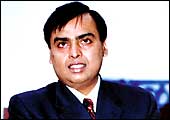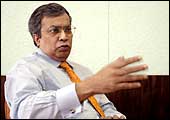|
The fifth floor office in Mumbai's
Nariman Point is neat and well appointed. The reception area is
small but, like the rest of the office, tastefully decorated.
The slightly fading Colaba skyline is visible through the sheet
glass windows at the far end. Two black computer consoles flicker
in a corner as stock prices flash real-time on their screens.
One can be forgiven for thinking it's the office of a well-to-do,
mid-rung stock broker. Only, it's not; it is the nerve centre
of The Chatterjee Group (TCG), a multi-billion-dollar private
equity fund that has invested more than $2 billion (Rs 8,800 crore)
in India alone.
Like his office, everything about Purnendu Chatterjee, the promoter
and principal shareholder of TCG, is understated. As he rushes
into the large conference room to the right of the reception area
for the interview in shirt sleeves, he apologises profusely for
keeping us waiting for seven-to-eight minutes beyond the appointed
hour. It's hard to believe that this man recently participated
in the largest international takeover ever by an Indian.
| WHY BASELL IS HOT THE VITAL STATS |
| TURNOVER |
$6.7 billion (Rs
29,480 crore) |
| EMPLOYEES |
6,600 |
| PLANTS |
21 countries |
| MARKETS |
120 countries |
| PATENTS |
8,500 |
| R&D LABS |
Germany, US, Spain, Korea, Japan,
Australia and UK |
| THE COMPETITION |
| |
Polypropylene
|
Polyethylene
|
Total
|
| BASELL |
8
|
10.5
|
18.5
|
| DOW |
1
|
9
|
10
|
| EXXON MOBIL |
2
|
7
|
9
|
| Figures are
capacities in million tonnes |
Ask him about it and he puts it in perspective. "We took
it over as part of a consortium with Leonard Blavatnik's Access
Industries," he clarifies. The details of the deal, though,
are still hazy. It is believed that Royal Dutch/Shell and BASF
finally chose the Chatterjee-Blavatnik consortium over National
Petroleum Company of Iran, the other shortlisted bidder, as a
result of pressure from the US government. The final bid price:
$5.7 billion (Rs 25,080 crore). Chatterjee declines to get into
the specifics of the financing arrangement. "The details
are being worked out," is all he says. But foreign media
reports suggest that Merrill Lynch has arranged $4.1 billion (Rs
18,040 crore) in debt that will be serviced out of Basell's cash
flows, while the partners are bringing in $1.6 billion (Rs 7,040
crore) in equity. Chatterjee adds that Credit Suisse First Boston
is also involved but declines to get into details about how much
each individual partner is bringing to the table. Here, the story
takes an interesting turn.
Media reports suggest that Marvin P. Bush, 49, the younger brother
of us President George W. Bush and Managing Partner of Winston
Growth Fund, Winston International Growth Fund and Winston Small
Cap Growth Fund, is one of his financial backers and helped him
pull off the deal. The alleged us pressure to nix the Iranian
bid fits in well with this theory, too. Chatterjee, however, emphatically
denies this. "I've also read about it," he says, adding:
"The confusion arises from the fact that I had floated a
fund called Winston Partners LP in 1991. It has nothing to do
with Marvin Bush and we have no business connections whatsoever."
 |
| Basell's plant in Wesseling, Germany |
How long will it take for the deal to close? "We are awaiting
regulatory approvals from the European Union (Basell is based
in The Netherlands)," he says, adding that he expects them
to come through in about three-to-four months.
Basell is the leader of the pack in polymers, there's no question
about that. Nearly 40 per cent of all the polypropylene produced
in the world uses Basell technology (see Why Basell Is Hot) "Basell
has an entrenched system of innovation and has institutionalised
the process of taking new discoveries to the market. This is what
attracted us to the company," says Chatterjee, explaining
why he zeroed in on Basell.
Now that his consortium is in command, does it also plan to
take control? "No," he says, "we have the deepest
respect for the current management of the company and will retain
it." Interestingly, a BASF press release issued soon after
the deal was signed quoted Chatterjee's partner Blavatnik as saying:
"I'm very pleased that we are the successful bidder for Basell.
We are experienced in industrial investments in companies that
compete in large, cyclical markets, and we believe Basell is an
attractively positioned global business with an excellent future.
I am very impressed by Basell's track record, and by the company's
highly professional and motivated management and workforce."
| THE BASELL DEAL |
SIZE: $5.7 billion (Rs
25,080 crore)
EQUITY: $1.6 billion (Rs 7,040 crore)
DEBT: $4.1 billion (Rs 18,040 crore)
DEBT ARRANGED BY: Merrill Lynch and CSFB
STRUCTURE: Special Purpose Vehicle
SHARE OF INDIVIDUAL PARTNERS: N.A.
OTHER SHORTLISTED BIDDER: National Petroleum Company
of Iran |
 |
PARTNERS:
Purnendu Chatterjee of TCG Group
and Leonard Blavatnik of Access Industries |
A spokesperson at Access Industries' head office on Fifth Avenue
in New York, however, made it clear that Blavatnik plans to exercise
his rights as a shareholder in giving direction to Basell. "The
acquisition is a natural growth of Access's activities. They have
been involved in large industrial companies. And Mr Blavatnik
looks to work closely with the management and employees to drive
Basell forward. Access, typically, takes active interest in companies
in which they (sic) have equity stakes."
Does this indicate a divergence in the way the two partners
are viewing this acquisition? Time will tell. But Constantin Gurdgiev,
Lecturer, Department of Economics, Trinity College, Dublin, offers
a chilling insight into what might happen. "Like most Russian
oligarchs, Blavatnik's primary objective is building up the asset
value of his holdings through acquisition and market power consolidation.
They (the oligarchs) are not able, competent entrepreneurs seeking
to expand the economic capacities of the enterprises under their
ownership, nor are they technocratic geeks capable of innovation
and technological enhancement of their assets. Instead they are
power-hungry monopolists of the old corporatist mentality."
Should TCG be worried? Again, time will tell. Chatterjee says
he has known his partner for about 15 years now and the two have
discussed the possibility of partnering each other in a deal "for
a long, long time. It didn't happen earlier; it's happened now".
| THE INVISIBLE MAN |
 |
 |
| Nerve centre: Leonard Blavatnik's
office in New York's Fifth Avenue |
Like most Russian billionaires,
Leonard Blavatnik's antecedents are shrouded in mystery. He
came to the US in the 1970s as an émigré when
relations between the two superpowers thawed and soon acquired
Ivy League credentials-a Masters degree from Columbia University
and an MBA from Harvard Business School.
A regular on the Forbes rich list, the 47-year-old Blavatnik
first shot into the limelight when he teamed up with Viktor
Vekselberg to set up Renova in 1990 as the Russian arm of
Access Industries, Blavatnik's private equity firm. Renova
took sizeable stakes in newly privatised Russian companies
like oil giant TNK and the Siberian Urals Aluminium Company.
In 2003, it sold a part of TNK to British Petroleum for
$6.4 billion (Rs 28,800 crore at the exchange rate prevailing
then). TNK-BP is Russia's third-largest oil company. The
two have a combined net worth of over $10 billion (Rs 44,000
crore).
Not everyone is impressed, though. "Blavatnik's primary
objective is building up his asset value through acquisition
and market power consolidation. His activities do not add
value to the Russian economy. All the oligarchs are power
hungry monopolists with the old corporatist mentality,"
says Constantin Gurdgiev, Lecturer, Department of Economics,
Trinity College, Dublin, and an authority on Russian oligarchs.
The reclusive and media shy Blavatnik (he declined to
be photographed for this report), who's a Director on the
board of Time Warner Music, has a voracious appetite for
conspicuous consumption. He reportedly purchased a $75-million
(Rs 330-crore) mansion in Kensington Palace Gardens, London.
A similar attempt at buying a swank apartment overlooking
New York's Central Park was, however, rebuffed earlier this
year.
-Anil Padmanabhan in New
York
|
For the moment, though, he's excited about the synergies between
Haldia Petrochemicals (HPL) and Basell. "The managements
of the two companies will have to take the final call on any collaboration,
but prima facie, HPL can use Basell's global network to export
its basket of products and improve marketing efficiency. Both
companies can benefit by going in for joint procurement and Basell
can leverage India's technical expertise and low-cost structure
to expand its global dominance," he says, adding that there
are no concrete plans in this direction and that he's merely thinking
aloud.
 |
| Haldia Petrochemical Company: Chatterjee's
first blow |
Chatterjee, who works an average of 12-15 hours a day, has other
interests too (see Chatterjee's Empire). He has huge investments
in information technology and biotech companies and is one of
India's largest software exporters. Since most of these are small
and mid-size companies, the individual figures aren't big enough
to get noticed, but make no mistake: he's there near the top,
with the best of them. He also has large exposures to the entertainment
and real estate sectors. "We financed an ill-fated Bollywood
film called Rules: Pyar Ka Superhit Formula, burnt our fingers
and decided that this wasn't our scene," he says with a chuckle.
Instead, he's now investing in entertainment infrastructure: he
has stakes in Rain, a popular Mumbai nightclub, and Galaxy Bowling
Alley. "We also develop intelligent infrastructure focussed
on the it and biotech sectors," says Chatterjee, who owns
large real-estate assets in Salt Lake's technology enclave. He's
also developing a 100-acre biotech park in Pune. The investment:
he's not saying.
| CHATTERJEE'S EMPIRE |
LIFE SCIENCES
Chem Biotech: This company does chemical and biological
analyses for drug discovery. It operates out of Pune and Kolkata.
TCGA: It gets its name from the four molecules that
make up DNA (A-T-C-G). The Center for Genomic Applications
is a joint venture with the Institute for Genomic and Integrated
Biology, a CSIR laboratory. It does genome analysis using
sequencing micro-array techniques to identify diseases and
their causes. TCGA is based in New Delhi.
Clinevent: This company does clinical research and
conducts trials for pharmaceutical MNCs. It is based in Mumbai.
SilicoGen: This firm deals with bio-informatics and
the development of systems biology. Its mission statement
is to create a new paradigm and business model in order to
lower the cost of drug development. It is based in Kolkata.
INFORMATION TECHNOLOGY
TCG Ivega: Software development company based in
Kolkata, Mumbai and Bangalore.
Skytech Solutions: This is a joint venture with
United Airlines for developing software for airlines and
airports. It is doing a lot of work for various Chinese
airports and is based in Kolkata.
Fitek: This company develops software for wealth
management and hedge fund accounting, and operates out of
Kolkata.
Labvantage Solutions: Yet another TCG Group company
that develops software for laboratory information management.
It is based in Kolkata and New Jersey.
BUSINESS PROCESS OUTSOURCING
Outsourced Partners International: OPI does accounting
work for multinational corporations and operates out of
Bangalore and California.
REAL ESTATE
TCG Urban Infrastructure Holdings: This company builds
modern, intelligent infrastructure primarily for IT, IT-enabled
and biotech companies. It is currently building International
Biotech Park on 100 acres of land in Pune. The TCG Group
also has huge real-estate holdings in the software sector
of Kolkata's Salt Lake surburb.
 |
| The Rain nightclub in Mumbai |
ENTERTAINMENT
Galaxy Bowling Co.: Owns a part of Galaxy Bowling
Alley in Mumbai and also owns a part of Rain, a nightclub
in Mumbai.
INDUSTRY
Haldia Petrochemical Company: Co-promoter of this
pet project of the West Bengal government. Expected to post
a profit this year after years of problems and losses. Based
in Kolkata.
|
| |
| THE BOY NEXT DOOR |
| He's the boy
next door who's made good. Before his trail blazing takeover
of Basell Polyolefins, Purnendu Chatterjee, 55, was known
in India as the George Soros associate who helped promote
Haldia Petrochemicals. Little else was known about him. "That's
the way I like it," he says. Getting him to talk about
himself is like extracting water from stone, but he finally
opens up after a lot of coaxing.
Born into a middle-class Bengali family, Chatterjee graduated
from the Indian Institute of Technology, Kharagpur, in 1971
with a degree in Mechanical Engineering after passing out
from the Ramakrishna Mission School in Narendrapur. From
IIT, it was a hop, skip and jump to the University of California,
Berkeley, where he completed a PhD in operations research
in 1974, joined Stanford Research Institute and moved on
to McKinsey & Co. after two years. His first big break
came when he was made a partner at the world famous consultancy
in 1984, at the age of 34. While at McKinsey, he married
the daughter of industrialist Viren J. Shah (a Gujarati;
usually strict vegetarians), who would go on to become a
BJP MP and later, the Governor of West Bengal. "She's
non-vegetarian; so there are no disputes at the dining table,"
he says jokingly, adding that like most Bengalis, he's fond
of fish.
But he soon grew tired of advising CEOs on how to run
their companies; he longed to become a mover and shaker
himself. "I quit my job and took over a small technology
company called John Beall & Co.," says the suave
and soft-spoken financier, describing his first independent
foray into the world of business. His mentor, George Soros,
whom he had met while at McKinsey, chipped in with $340,000
to finance the deal.
This was the first of a series of leveraged and, sometimes,
hostile takeovers that would make Chatterjee both a respected
and feared name in US corporate circles. He had his share
of controversies, too. In 1986, he launched a hostile takeover
for T-bar, a mid-sized computer company, which took him
to court alleging that he had violated US stock-market watchdog
Securities and Exchange Commission (SEC) guidelines. The
court ordered Chatterjee to pay $114,500. Four years later,
he faced allegations of insider trading in Foxboro &
Co., a large manufacturer of industrial instruments in which
he and Soros held a 4.8 per cent stake and on whose board
he sat as a director. This ended in a consent decree with
SEC whereby he paid $643,855 without admitting any wrongdoing.
Ask him about these and he says: "It was a long time
ago and no charge was established."
In India, Chatterjee, who drives a Mercedes and wears
suits custom tailored in New York, has built up a formidable-albeit
low profile-portfolio of technology, real estate, entertainment
and industrial companies with a combined turnover of about
Rs 8,500 crore (see Chatterjee's Empire). Since almost all
his companies are privately held, exact numbers are hard
to come by, but insiders estimate that his IT companies
alone export software worth Rs 1,500-2,000 crore annually,
making him one of India's larger software czars.
Chatterjee, who became a US citizen 15 years ago, now
divides his time between New York, where he maintains a
small apartment, and Mumbai, where his wife and family stay.
How much is he worth? Again, as with most fund managers,
it is difficult to get a fix on his personal wealth. But
people who know him since the days he first entered India
as the geeky-looking white knight who rescued Haldia Petrochemicals
from the brink of oblivion estimate that he is worth about
$1 billion (Rs 4,400 crore).
Whew! The boy next door has come a long way.
|
The Basell takeover has brought Chatterjee from the peripheries
of India's industrial scene to its centrestage, but rivals and
friends alike find it difficult to size up the man. One of India's
leading industrialists calls him "very, very clever and a
great dealmaker who can work with all kinds of players-even if
they themselves are rivals". Even a cursory glance at his
personal and professional dossiers will show that to be spot on.
He's the son-in-law of industrialist-turned BJP MP-turned West
Bengal Governor Viren J. Shah; yet, he's the poster boy of communist
West Bengal: he enjoys warm relations with Marxist icon Jyoti
Basu, Somnath Chatterjee and Buddhadeb Bhattacharjee. He's been
investigated for insider trading by the sec in the us, but he
partners Ratan Tata, who's known for his squeaky clean image,
in HPL. He is also buddies with Rajat Gupta, the first and only
Indian Managing Director of McKinsey, and Kanwal Rekhi, bulge
bracket venture capitalist and one of the founders of The Indus
Entrepreneurs.
 |
| RIL Chairman Mukesh Ambani: Matrix challenged |
Managing contradictions and moving on seems to be the leitmotif
of his career. But where does George Soros, his early mentor,
fit into his scheme of things now? "We did a lot of projects
together," he says, "but now I operate independently
and have no further business connections with him."
The associate has clearly come into his own. But despite his
dizzying success, he remains a middle-class boy at heart. "I
don't really have much time to spare, but whenever I do, I like
to relax by listening to Bollywood songs and Rabindrasangeet,"
he says.
Any more big deals in the offing? He smiles enigmatically. "Let's
see," he signs off, tantalisingly.
-additional reporting by Anil Padmanabhan
in New York
PURNENDU SPEAKS
"Sustainable competitive advantage
is the key" |
 What's
your investment philosophy? What do you look for while deciding
on an investment proposal? What's
your investment philosophy? What do you look for while deciding
on an investment proposal?
(Laughs) There are various issues that I look at. But the
most important are: does the company have a sustainable
competitive advantage? Does its management have the vision
and the capacity to stay the course? And does the company
have the potential to become a big business in the foreseeable
future? I move in only if the answers to all three questions
are in the affirmative. Thereafter, I provide only operational
and management guidance. The managment is fully empowered
to execute the agreed business plan.
Why did you invest in Basell? Will you and Leonard
Blavatnik micro-manage the company?
Basell is the world leader in polymer technology, owns
more than 8,500 patents and has manufacturing facilities
in 21 countries. So it is a prized company to control. It
also has a strong management in place, which we will retain.
Our job will be to provide inputs when the need arises and
to work with the management to take the company's leadership
position forward.
Where does Haldia Petrochemical fit into the picture?
That is for the two managements to sit together and figure
out. It's early days yet, so I can't give you any details.
But yes, it is our intention that we fully exploit the synergies
that exist between the two companies and extract maximum
value for all the stakeholders in the two ventures.
|
|












 What's
your investment philosophy? What do you look for while deciding
on an investment proposal?
What's
your investment philosophy? What do you look for while deciding
on an investment proposal?